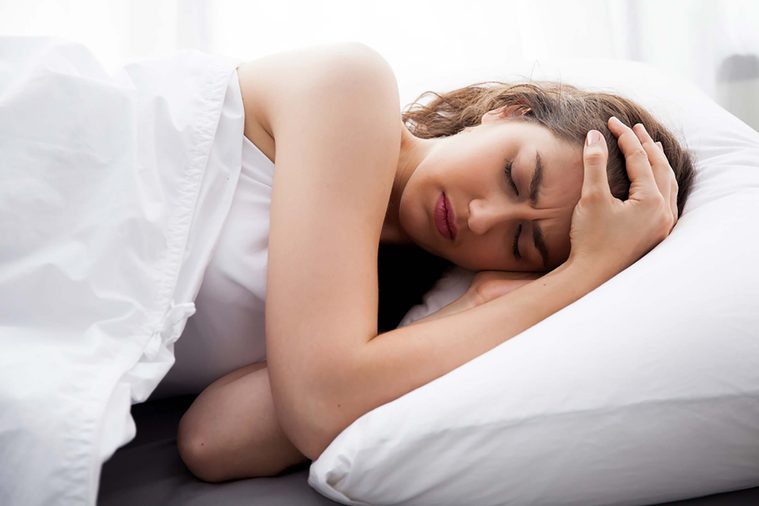There May Be a New Way to Treat Migraines in Women, Says Study
Updated: Apr. 29, 2021
A possible migraine treatment has been out of bounds to many menopausal women—but that may be about to change
 If you think a migraine is just a bad headache, talk to a sufferer. Just figuring out the cause can be a nightmare—here’s a list of potential migraines triggers. Then there’s the pain: According to the Migraine Research Foundation, a migraine headache is “an extremely incapacitating collection of neurological symptoms that usually includes a severe throbbing recurring pain on one side of the head.” Women get the short straw when it comes to migraines—three times as many women get them compared to men. Now there’s a potential solution for female sufferers: A new study from the Women’s Health Initiative (WHI) and presented during the 2017 North American Menopause Society (NAMS) Annual Meeting in Philadelphia suggests that hormone therapy for migraine treatment in women is safer than experts previously thought—offering a new treatment option to thousands of sufferers.
If you think a migraine is just a bad headache, talk to a sufferer. Just figuring out the cause can be a nightmare—here’s a list of potential migraines triggers. Then there’s the pain: According to the Migraine Research Foundation, a migraine headache is “an extremely incapacitating collection of neurological symptoms that usually includes a severe throbbing recurring pain on one side of the head.” Women get the short straw when it comes to migraines—three times as many women get them compared to men. Now there’s a potential solution for female sufferers: A new study from the Women’s Health Initiative (WHI) and presented during the 2017 North American Menopause Society (NAMS) Annual Meeting in Philadelphia suggests that hormone therapy for migraine treatment in women is safer than experts previously thought—offering a new treatment option to thousands of sufferers.
Migraine attacks can last between four and 72 hours and can be accompanied by visual disturbances, nausea, vomiting, dizziness, extreme sensitivity to sound, light, touch, and smell, or tingling or numbness in the extremities or face. As bad as that sounds, many women find that their migraines worsen or occur more frequently with menopause. (Here are 10 signs of early menopause all women should be aware of.)
Although estrogen can ease migraines, doctors have been reluctant to prescribe the hormone therapy because of links to an increased risk of stroke in female sufferers. The new study looked at data for 67,903 participants of the WHI clinical trials in order to better understand the relationship between migraines, stroke, and other types of cardiovascular disease in the context of hormone therapy. Despite the stroke concern, researchers couldn’t detect an increase in the risk of cardiovascular disease for women with a history of migraines. More importantly, female migraine sufferers on hormone therapy weren’t at any higher risk of stroke or heart disease.
“Since migraines affect one in every four women and women with migraines are often advised to avoid hormone therapy, these findings may have significant public health implications,” says Jelena Pavlovic, MD, lead author of the study from Albert Einstein College of Medicine in the Bronx, as reported on ScienceDaily.
“We know that changes in estrogen lead to migraines for many women,” says JoAnn Pinkerton, MD, NAMS executive director. “Yet, there has been very little research focused on migraines through the menopause transition when estrogen levels can fluctuate greatly. This study clearly demonstrates the need for more research in this area so symptomatic women can benefit from proven therapies.”
Check out 10 other proven ways to treat migraines.